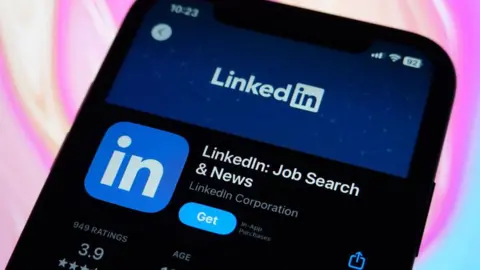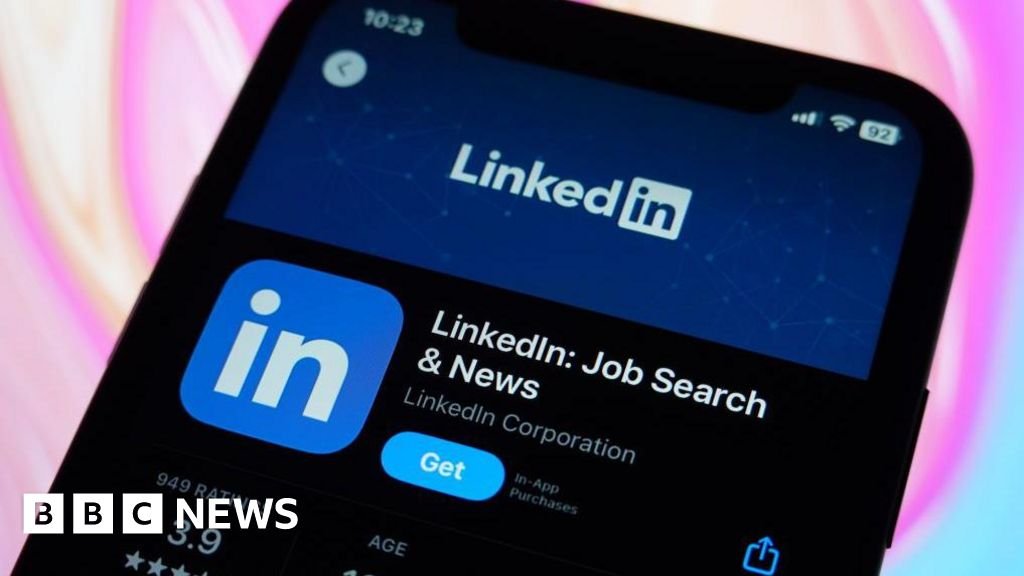 Getty Images
Getty ImagesProfessional networking site LinkedIn has told Australian lawmakers it is too boring for children to merit inclusion in a proposed ban on social media for under-16s.
“LinkedIn simply does not contain content that is interesting and attractive to minors,” the Microsoft-owned company said in a submission to an Australian Senate committee.
The Australian government has said this “World-leading” legislation to be introduced Block children from accessing social media platforms.
But some of the companies behind the platform most popular with young people — Meta, Google, Snapchat owner Snap Inc and TikTok — have challenged the planned law in submissions to lawmakers.
Prime Minister Anthony Albanese said the proposed laws were to address the harm caused by social media to Australian children.
He said it was for “moms and dads” who, like him, are “very concerned about our children’s online safety.”
Other countries are closely watching the progress of the legislation, some of which – including uk – Indicates their willingness to follow suit.
Australia’s Senate Environment and Communications Legislation Committee gave respondents one day to comment on the bill, which would amend its existing online safety laws.
it is report to senate It was concluded that the bill should be passed if its recommendations, such as involving young people in the delivery of the legislation, were taken into account.
‘Major concerns’
However, the world’s largest tech companies responded by laying out why they were unhappy with the proposed law.
Google, which owns YouTube, and Instagram parent company Meta said they needed more time to consider the legislation.
Meta said that in its current form “it will not achieve its aim of reducing the burden on parents to manage young people’s safety on social media”.
It also claimed it “ignored evidence from child safety and mental health experts” – a sentiment that Snapchat agreed with in its own submission.
X (formerly Twitter) also questioned the legality of the proposed bill.
TikTok Australia said it had “serious concerns” about the proposed bill.
Like other platforms that have commented on the legislation, it said it “depends” on the ongoing Age Guarantee trial, which looks at technology to effectively check users’ ages.
Ella Woods-Joyce, director of public policy for TikTok Australia and New Zealand, wrote in the company’s filing that the bill’s “rushed passage could create serious risks of further unintended consequences”.
But LinkedIn took a different approach – arguing in its submission that it was a platform that was simply not of interest to children.
The company said its minimum age requirement is 16, meaning they cannot access it, adding that child accounts are deleted if they are discovered.
If LinkedIn can successfully argue that it should not be included in the legislation, it could potentially avoid the cost and disruption of introducing an additional age verification process on the site.
“Regulating the LinkedIn platform under the proposed legislation would create unnecessary barriers and costs to age assurance for LinkedIn’s members in Australia,” the report said.
Interests elsewhere
The Australian government has said it hopes to introduce the legislation before the end of the parliamentary year.
But experts say the bill’s timeline and current makeup fail to provide the opportunity for adequate scrutiny.
Carly Kind, the country’s privacy commissioner, said In a LinkedIn post She told a public Senate hearing on Monday that she was concerned about the “broad privacy implications of the social media ban.”
Human Rights Commissioner Lorraine Findlay calls one-day window to submit legislative response “wholly inadequate” In a post on LinkedIn on Thursday..
“We need actual consultation, not just superficial consultation,” she said.
Still, the Australian government’s plans are sparking interest elsewhere.
In the UK, technology minister Peter Keir told the BBC this month that similar legislation was “on the table”.
France has introduced legislation requiring social media platforms to block access by children under 15 without parental consent – despite research showing that nearly half of users are able to bypass the ban using a simple VPN.

